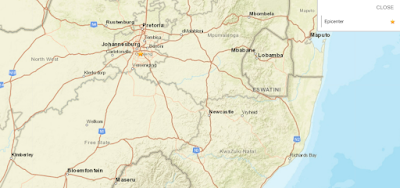The South African Council for Geosciences recorded a Magnitude 4.4 Earthquake beneath the city of Boksburg, East Rand urban conurbation of Gauteng Province, South Africa, slightly before 2.40 am local time (slightly before 0.40 am GMT) on Sunday 11 June 2023. There are no reports of any damage or casualties associated with this event, though many people reported feeling it between Pretoria, Kimberley, and the Eswatini border.
Earthquakes of any size are relatively rare in South Africa and because of this rarity it is hard to make precise judgements about the cause of quakes in South Africa, due to a paucity of data. Northwestern South Africa is close the southern end of the Great Rift Valley exits the continent and passes out under the Indian Ocean on the coast of Mozambique. The Great Rift Valley is slowly splitting the African Plate in two allow a line from the Red Sea through Ethiopia, and which includes the great lakes and volcanoes of east-central Africa. This has the potential to open into a new ocean over the next few tens of millions of years, splitting Africa into two new, smaller, continents; Nubia to the west and Somalia to the east.
Earthquakes can also sometimes be triggered by mining activity, and settling movements at old mine sites, and the location of the Boksburg mine is close to the East Rand Proprietary Mine, from which gold was excavated between its founding in 1893 and closure in 2008. A Magnitude 4.4 event would be exceptionally large for a mine-related Earthquake, but the East Rand Mine is no ordinary mine site, it was once the deepest mine in South Africa (and therefore the deepest mine in the world, the world's six deepest mines all being in South Africa). The East Rand Mine reached a depth of 3.585 km by the time it closed, a depth which has been surpassed only by four other mines; the Savuku Gold Mine in Carletonville, Gauteng Province, which reached 3.7 km in depth by the time of its closure in 2017; the TauTona Mine, also in Carletonville, which reached 3.9 km deep by the time it closed in 2018, and the Mponeng Gold Mine, in Mponeng, Gauteng Province, which is 4.0 km deep and still active.
See also...
Follow Sciency Thoughts on Facebook.
Follow Sciency Thoughts on Twitter.








